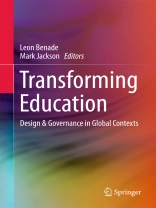This book is an edited collection grouped into three key thematic areas. Its authors are researchers and theoretical scholars in the fields of education curriculum, education technology, education philosophy, and design for education. They present primary research and theoretical considerations, descriptive accounts and philosophical reflections to provide readers with a broad sweep of the ‘state of play’ in thinking about the place and space of learning.
Transforming Education distils, from a panoply of critical arenas, an understanding of the forces currently at play in redefining curriculum agendas for education – from primary to post-secondary. It analyses the major ways in which the built environment of education is transforming, in response to various globalised policy drivers and new education delivery technologies. Its authors critique the ways education performs a governance function over the users and occupants of space, be it physical or virtual.
For readers who may be seriously engaging with the concept of spatiality in relation to education for the first time, this book provides the opportunity to develop a clear understanding of a wide scope of theory, practice and critique in relation to learning environments.
Table of Content
Part I: Transformation: Education through design.- Chapter 1. Modern learning environments: Embodiment of a disjunctive encounter.- Chapter 2. Spatialised practices in ILES: Pedagogical transformations and learner agency.- Chapter 3. Reimagining and reshaping spaces of learning: Constituting innovative and creative lifelong learners.- Chapter 4. Innovative learning environments as complex adaptive systems: Enabling middle years education.- Chapter 5. Trialling innovation: Studying the philosophical and conceptual rationales of demonstration schools in universities.- Part II: Transformation: The Governmentality of Education.- Chapter 6. Selling new learning spaces – Flexibly anything for the 21st century.- Chapter 7. MLE as non-place.- Chapter 8. From progressivism to instrumentalism: Innovative learning environments according to New zealand’s Ministry of Education.- Chapter 9. An art of orientation: The possibilities of learning spaces.- Chapter 10. Questions concerning innovative learning environments: Intersections in disciplined resistance.- Part III: Transformation: Global perspectives on Education.- Chapter 11. Crossing or erasing territorial borders: Towards openness within the school space.- Chapter 12. Student-centred classroom environments in upper secondary school: Students’ ideas about good spaces for learning vs. actual arrangements.- Chapter 13. Virtual reality: Its transformative potential.- Chapter 14. Coup d’etat in the panopticon: Social networking in Education.- Chapter 15. Transferring pedagogical spaces – Schoolyards as learning environments in the perspective of students and teachers.
About the author
Leon Benade has research interests in teachers’ work, school policy, ethics, philosophy in schools, critical pedagogy, and the New Zealand Curriculum. Leon’s current research work focuses on how ’21st century learning’ impacts the work of teachers and school leaders, particularly in relation to the establishment of Flexible and Innovative Learning Environments and digital pedagogies. Related areas of interest include the question of teachers’ critical reflective practice and the evolving role and nature of the concept of ‘knowledge’ in the 21st century curriculum. Leon is currently on the Executive Committee of the Philosophy of Education Society of Australasia (PESA). He serves on the editorial board of the New Zealand Journal of Educational Studies, is co-editor of the New Zealand Journal of Teachers’ Work and associate editor of Open Review of Educational Research. Leon Benade is author of From Technicians to Teachers (Continuum) and Being a Teacher in the 21stst Century (Springer).
Mark Jackson’s principal research interests are in a broad platform of philosophical approaches to ethics in design cultures and architecture. He has published on the work of Jacques Derrida, Emmanuel Levinas, Martin Heidegger, Michel Foucault, Gilles Deleuze and Walter Benjamin, with respect to design cultures, design theory and approaches to design research, with a particular emphasis on post-humanist engagements with ethics. He has also published on the literary philosophy of Maurice Blanchot, and feminist writings associated with the works of Hélène Cixous and Luce Irigaray. He has also produced film and digital video works for exhibition, and has published in the field of film and philosophy.












